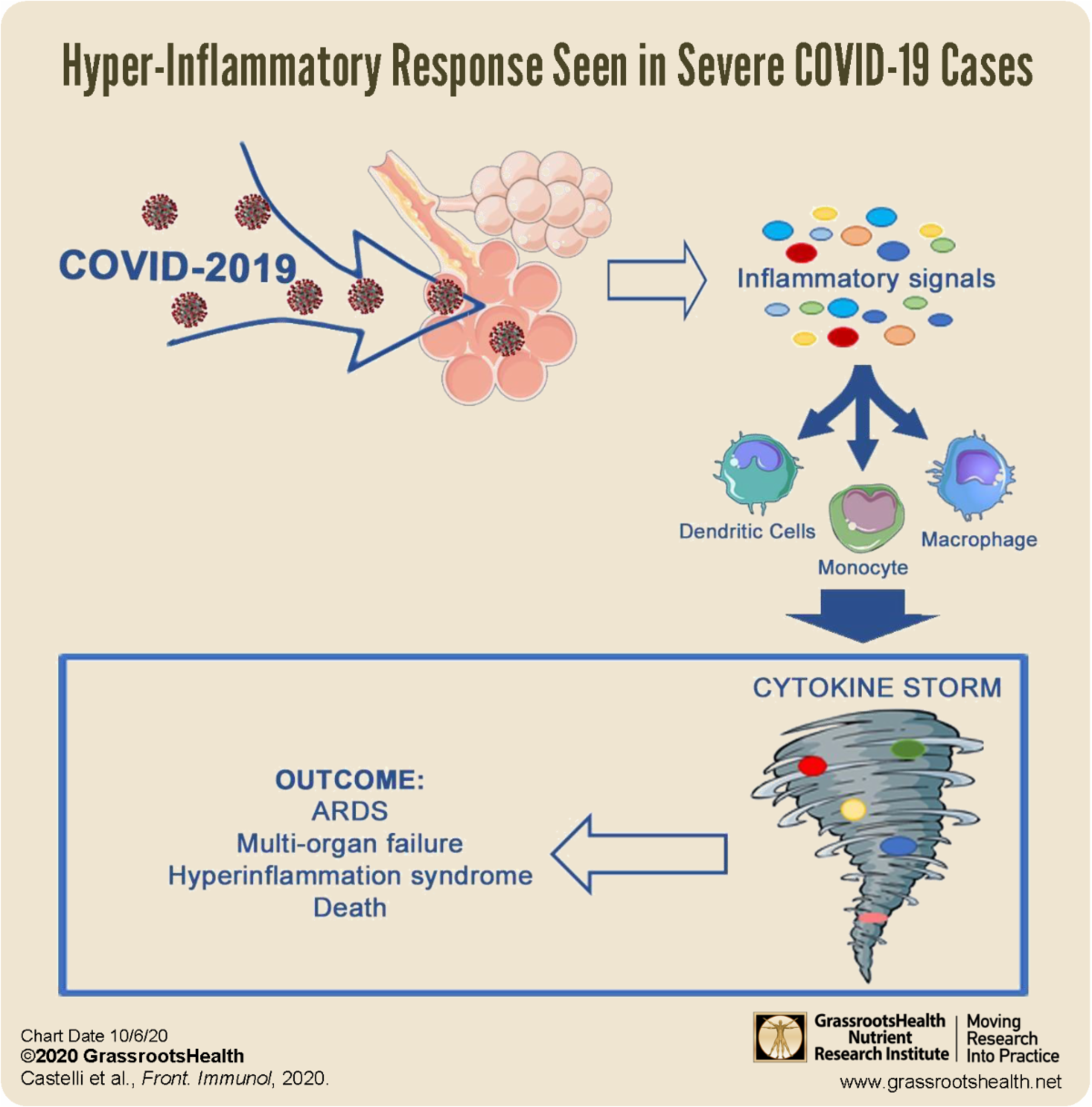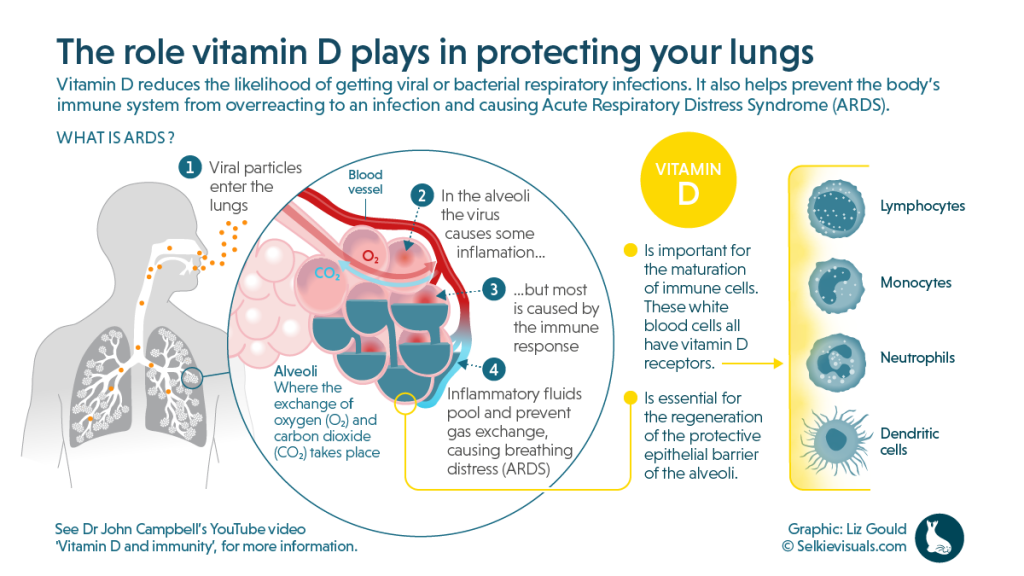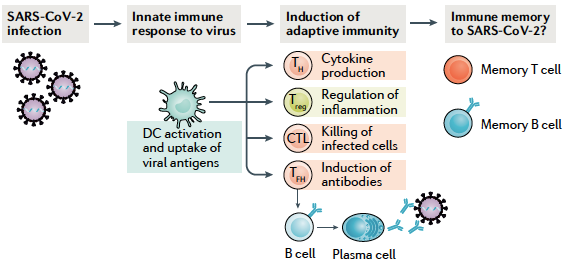Table of contents
Part 1 Oct 2, 2020
Vitamin D deficiency has now been shown to increase susceptibility to COVID-19 and increase the risk of COVID-19 severity, including ICU admission and death. Conversely, other published studies have also shown those with higher vitamin D levels (over 30 ng/ml or 75 nmol/L) have a reduced risk of severe symptoms and death due to COVID-19. In fact, an analysis of over 190,000 Americans found that having vitamin D levels of at least 50 ng/ml resulted in a 53% lower positivity rate than those whose levels were less than 20 ng/ml! The first-published randomized controlled trial on vitamin D and COVID-19 found that adding vitamin D to the standard treatment nearly eliminated ICU admissions and did eliminate deaths.
It sounds almost too good to be true... Yet vitamin D is known to influence the expression of thousands of genes and is involved in regulating over 80 biological pathways in the body. Vitamin D is not a miracle drug, nor does it act alone, but it is an important mediator of immune function, and we can largely control whether or not we get enough vitamin D from our daily habits (sun, diet and supplements).
Today we will explain HOW vitamin D acts to protect you from getting COVID-19, and in an upcoming Part 2, we will discuss how vitamin D helps improve symptoms if you do get COVID-19.
Vitamin D is Known to Help Prevent Upper Respiratory Tract Infections
Vitamin D is known to help fight upper respiratory tract infections. As previously discussed, a large meta-analysis including 25 randomized controlled trials with over 11,300 individuals showed that vitamin D supplementation reduced the risk of respiratory tract infections by 70%. GrassrootsHealth participants with vitamin D levels greater than or equal to 40 ng/mL were 41% less likely to have had the flu and 15% less likely to have had a cold in the prior 6 months than participants with levels less than 20 ng/mL.
Acute Respiratory Distress Syndrome (ARDS) is a major complication and cause of death among those with serious COVID-19 infections. When comparing vitamin D levels among those with and at risk of ARDS, one study found that 96% of those at risk of ARDS were deficient in vitamin D.
Vitamin D Can Protect Lung Cells from SARS-CoV-2 Attack
COVID-19 is caused by a coronavirus (a specific type of virus) called SARS-CoV-2. Infection of COVID-19 begins when the SARS-CoV-2 virus enters the cells of the lung by binding the angiotensin-converting enzyme 2 (ACE-2) receptor and de-activating it, resulting in inflammation. Vitamin D is responsible for increasing ACE-2 expression, which allows it to carry out its anti-inflammatory actions to help protect the lungs and keep inflammation at bay.
During the early incubation stage when the virus is hijacking the cell there are generally no symptoms. Most people who are infected with SARS-CoV-2 experience mild-moderate respiratory symptoms and recover without any need for hospitalization or therapy. In those who do experience more severe symptoms, only a small percentage have severe enough symptoms for the virus to be life threatening. This difference in both susceptibility (whether the virus is able to invade) and recovery (how well the body fights it off if it does invade) is attributed to the individual’s immune response. Vitamin D may help protect against COVID-19 specifically through maintenance of physical barriers (susceptibility) and regulation of innate and adaptive immunity (mounting an effective immune response to the virus).
The graphic below provides a very clear illustration of several ways vitamin D acts to directly protect the lungs, from its effect on the protective barrier of the lungs, to its involvement in the maturation of immune cells, and its role in regulating the inflammatory response and inhibiting the cytokine storm (which will be covered in more detail in Part 2).
Vitamin D Regulates the Immune Response
Vitamin D plays a crucial role in regulating immune system activity – both innate and adaptive responses. As previously described, the innate immune system is responsible for the initial defensive front with a central role played by phagocytes. Vitamin D stimulates expansion of these phagocytes (monocytes and macrophages) increasing their ability to fight off the virus by increasing their numbers, as well as increasing their killing capacity through stimulating the production of the anti-viral protein cathelicidin. Vitamin D also acts to regulate the maturation of dendritic cells which are important for activating CD4+ T cells and in turn the rest of the immune response.
Earlier studies have shown that in SARS and influenza the adaptive immune cells, T cells and B cells, are vital in defending the body against the virus. Many studies have found this to be the case in COVID-19 as well, with both antibody and cellular defenses being recruited to the fight. Vitamin D is a potent regulator of adaptive immunity, including both cell-mediated (T cell) and humoral (B cell) immunity.
Cox R and Brokstad K, Nature Reviews, 2020.
Click to Download & Print
Once SARS-CoV-2 has been successful at replicating itself and spreading to surrounding cells, mild to moderate symptoms progress (e.g. sore throat, cough, fever and muscle aches) that result from localized and appropriate inflammation, associated tissue damage and antiviral activity of B cells and T cells. CD4+ and CD8+ T cells secrete cytokines (chemical signals that instruct other cells what to do) and are central to the successful elimination of COVID-19, as happens in most people. Unfortunately, more serious symptoms and death can result with an over-reactive or ineffective immune response, as can happen when there is not enough vitamin D for use. The role of vitamin D at this stage will be covered in Part 2.
Thus, vitamin D is important to help fend off an attack by SARS-CoV-2. Ensuring optimal levels of vitamin D is an easy way to help support your immune system response.
Better Results when Taken Together
Nutrients work synergistically in order to carry out specific functions within the body. For example, we have recently discussed how different immune cells rely on a variety of nutrients, including vitamins D, C, B6, B12, zinc, and magnesium, in order to carry out their actions in an immune response. Without these necessary nutrients, immune function may be hindered.
Could a nutrient deficiency be putting a damper on your immune response? Find out by testing your vitamin D, omega-3s, magnesium and other essential elements (including selenium), as well as your inflammation levels, with the new Immune Boost home test kit offered by GrassrootsHealth. Measuring levels is the only way to know if you are supporting your immune system and whether additional changes should be made, with supplementation, dietary changes, or both.
Part 2 Oct 9, 2020
 |  |
 |  |
Vitamin D is used by every cell of the body, influences the expression of thousands of genes, and is involved in regulating over 80 biological pathways – importantly, vitamin D is a potent regulator of immune function. However, it may still be surprising how much one vitamin can influence the body’s response to a COVID-19 infection. Vitamin D deficiency has now been shown to increase susceptibility to COVID-19 and increase the risk that if you do have COVID-19, it will be severe enough to require hospitalization in the ICU and lead to death. Conversely, published studies have also shown reduced risk of severe symptoms and death due to COVID-19 with higher vitamin D levels (over 30 ng/mL). In fact, an analysis of over 190,000 Americans found that having a vitamin D level of at least 50 ng/ml resulted in a 53% lower positivity rate for SARS-CoV-2 infection than those with levels less than 20 ng/ml! The first-published randomized controlled trial on vitamin D and COVID-19 found that adding vitamin D to the standard treatment nearly eliminated ICU admissions and did eliminate deaths!
In Part 1 we reviewed how vitamin D acts to protect against COVID-19. Today we will describe how vitamin D influences the immune system in ways that are beneficial, such as preventing the hyper-inflammatory response characteristic of severe COVID-19 infection.
Vitamin D Regulates the Immune Response
Vitamin D plays a crucial role in regulating immune system activity – both innate and adaptive responses. As described in Part 1, vitamin D increases the innate immune response and may help reduce entry of SARS-CoV-2 into cells in the lung and reinforce the physical barriers, or junctions, between cells, which in turn may help prevent the spread of the virus between cells. Vitamin D also stimulates expansion of phagocytes (monocytes and macrophages) increasing their ability to fight off the virus by numbers. In addition, vitamin D directly stimulates phagocytes and lung cells to produce anti-viral proteins, cathelicidin and defensins, that kill the virus. However, an appropriate adaptive immune response is a vital part of the body’s defense against SARS-CoV-2. Vitamin D is a potent regulator of adaptive immunity, including both cell-mediated (T cell) and humoral (B cell) immunity. Vitamin D is needed by these white blood cells to help them recognize, bind to, and destroy SARS-CoV-2.

Click to Enlarge & Print
What Causes A Severe SARS-CoV-2 Infection?
Once SARS-CoV-2 has been successful at replicating itself and spreading to surrounding cells, mild to moderate symptoms progress (e.g. sore throat, cough, fever and muscle aches) as part of a normal immune response to the virus. CD4+ and CD8+ T cell responses including secreted inflammatory cytokines are central to the successful elimination of COVID-19, as happens in most people.
However, in some people the immune response goes awry at this point and generates a hyper-inflammatory state referred to as the “cytokine storm” as depicted in the diagram below. The cytokine storm is the leading theory that explains why some people have a severe reaction to coronaviruses while others only experience mild symptoms. Moderate levels of inflammation are associated with mild-moderate symptoms of COVID-19, whereas the cytokine storm generates a hyper-inflammatory state associated with severe COVID-19 symptoms.

Click to Enlarge & Print
The cytokine storm results from a sudden acute increase in circulating levels of different pro-inflammatory cytokines including IL-6, IL-1, TNF- a, and interferon produced mostly by T cells. These inflammatory cytokines, in addition to the ongoing replication and spread of the virus, trigger more immune cell involvement and tissue damage that leads to acute respiratory distress, multiple organ failure and possibly death. By dampening the cytokine storm, we can reduce the severity of symptoms and the risk of death.
Vitamin D Helps Control the Cytokine Storm and Reduce Symptom Severity
Vitamin D acts in many ways to regulate the adaptive immune response. Vitamin D stimulates CD4+ T cell proliferation and cytokine production, and antibody activity (B cells). Vitamin D acts to regulate T cell response through initiating dendritic cell tolerance. These dendritic cells in turn stimulate the increased production of T regulatory (Treg) cells and their production of anti-inflammatory interleukin (IL)-10, switching the response from being Th1-driven and pro-inflammatory to a Th2-driven anti-inflammatory response.
Vitamin D acts to suppress the production of inflammatory cytokines (such as IL-1, IL-6 and IFN which are predominant in the cytokine storm characteristic of severe COVID-19). Vitamin D also has an effect on the actions of B-cells and inhibits the production of antibodies. Overall, the immunomodulatory actions of vitamin D play a very important role in preventing the activation of an inappropriate hyper-inflammatory immune response.
Because the virus also binds ACE-2 receptors it interrupts the renin-angiotensin system, responsible for regulating blood volume, a pathway that is also regulated by vitamin D. Ensuring sufficient vitamin D may improve response to the virus in the lungs and lessen the impact of SARS-CoV-2 infection on reduced levels of surfactant (a liquid secretion that allows the lungs to open and fill with air) which may then reduce the impact of SARS-CoV-2 infection on the ability to breathe.
Thus, vitamin D is important to help regulate the immune response to a SARS-CoV-2 infection. Ensuring optimal levels of vitamin D is a safe and easy way to help support your immune response.
Do you know your vitamin D level?
Measure your vitamin D level today! When you know what your level is, you can determine next steps to take and how much supplementation may be needed if you are below your target level. A panel of 48 International Vitamin D scientists recommend a level between 40-60 ng/ml (100-150 nmol/L) - where are you?
See also in Vitamin D Life
COVID-19 news
COVID-19 and Dark Skins
COVID-19 treated by Vitamin D - studies, reports, videos
As of March 31, 2024, the Vitamin D Life COVID page had: trial results, meta-analyses and reviews, Mortality studies see related: Governments, HealthProblems, Hospitals, Dark Skins, All 26 COVID risk factors are associated with low Vit D, Fight COVID-19 with 50K Vit D weekly Vaccines Take lots of Vitamin D at first signs of COVID 166 COVID Clinical Trials using Vitamin D (Aug 2023) Prevent a COVID death: 9 dollars of Vitamin D or 900,000 dollars of vaccine - Aug 2023
5 most-recently changed Virus entries
and has the following recent updates
Recent COVID-19 articles Click here for all VIRUS articles on Vitamin D Life
- COVID fought by Vitamin D: 2.3X less likely to die of COVID if supplemented, 1.9 X less likely to become infected – meta-analysis March 2024
- US has the most vaccinations before age 1 and the most deaths - March 2024
- Benign Cancers of a portion of the brain increased 1.8 X after vaccines were available - March 2024
- Long-COVID 3.1 X more likely if insufficient amounts of Magnesium and Vitamin D – March 2024
- COVID US survey: 43% not expect to ever return to normal – Gallup March 2024
- COVID-19 leaves its mark on the brain, dropping in IQs - March 2024
- 100% not need COVID hospitalization with fluvoxamine plus one other drug – Thailand RCT April 2024
- COVID maximum downregulation of Vitamin D receptor and CYP27B1 resulted in death - Feb 2024
- COVID-19 vaccines adverse events: myocarditis, pericarditis, etc. (99 million people, not US) – Feb 2024
- COVID could have been stopped in Wuhan – book March 2024
- Vitamin D: Viral infections, Infectious diseases, EBV and MS, Virus and Cancers – Grant March 2024
- Senator Ron Johnson hosted talks on COVID treatments - 2020 - 2024
- COVID infection (without hospitalization) – 1.7X more likely to die in 6 months if low Vitamin D – March 2024
- COVID senior pneumonia deaths: 50% if low Vitamin D and unvaccinated vs 16% if Vitamin D or vaccinated – June 2023
- 5 X less COVID infection of health care workers who took lots of vitamin D – meta-analysis Feb 2024
- 18,000 schoolchildren in Canada to be suspended for not being vaccinated - Feb 2024
- Vaccines increased your risk of dying of COVID in NZ - official data - Feb 2024
- Study urged a global moratorium on mRNA vaccines (300 peer reviewers agreed) – Jan 2024
- CDC recommends 100 vaccinations by age 18 – Feb 2024
- Professor Raoult is calling for a moratorium on COVID-19 vaccines - Jan 2024
- COVID deaths cut in half by a single dose of 600,000 IU of Vitamin D - RCT Jan 2024
- Is 50 ng of Vitamin D enough to fight COVID - TrialSiteNews - Jan 2024
- COVID and or vaccinations causing less Vitamin D and more sickness - Jan 2024
- Long-COVID a month shorter if more than 20 ng of Vitamin D - Jan 2024
- COVID, Vitamin D, Drs. Grimes and Campbell - Jan 2024
- All died of COVID with standard vitamin D, 25% survived if 10X more vitamin D (mice) – Dec 2023
- COVID infections and vaccinations decrease Vitamin D – many studies
- Moderna is monitoring 150 million websites for ‘Anti-Vaccine’ Narratives - Nov 2023
- But not Vitamin D Life, so far
- The four viruses that are increasing at an ‘exponential rate’ (are all fought by Vitamin D) – Nov 2023
- COVID death rate 4X less at high altitude (more UVB which makes Vitamin D) - Oct 2023
- Doctors in NY cannot opt out of COVID boosters for children - Oct 2023
- Multiple COVID vaccinations might increase (turbo) Cancer Incidence - many studies
- COVID fought by Vitamin D - video review of literature with transcript - Dec 2021
- What to do if you catch COVID - Dr. McCullough Sept 2023
- Long COVID with Neuro-Cognitive symptoms had especially low vitamin D levels – Sept 2023
- Mask studies for viral infection: 104 studies: ineffective, 61 studies: harmful - Sept 2023
- The ONLY Solution to Long COVID (Vitamin D) - video and transcript Sept 2023
- Long-COVID can hide in the body for years in scores of locations – Sept 2023
- Vaccine Clinical Trial - cardiovascular death 3.7X more likely if vaccinated - preprint Sept 2023
- One in five people with long COVID can no longer work (Doctors in this case) - Sept 2023
- Number of people with long COVID could be vastly underestimated - Aug 2023
- mRNA Vaccine Toxicity -free book by Doctors for COVID Ethics - Aug 2023
- Politics says put your masks back on, Science says masks may INCREASE COVID infection - Aug 2023
- Epstein-Barr Virus may be a prerequisite for Multiple Sclerosis - July 2023
- COVID Vaccinations increased risk of cardiac deaths in youths by 19% - Aug 2023
- Athletes who had been COVID infected had lower Vitamin D levels – July 2023
- Vitamin D was the most popular supplement during the COVID Pandemic – July 2023
- COVID cost the US 18,000 dollars per survivor, and many excess deaths - July 2023
- COVID, Long-COVID and Vitamin D in children - Review April 2023
- COVID in hospital stopped by Vitamin D Receptor activators (curcumin, quercetin) – RCT June 2023
- Children with COVID 4X more likely to have poor Vitamin D Receptors (Note: COVID deactivates VDR) – April 2023
- Chance of moderately severe COVID 3X less likely if plant-based diet – April 2021
- COVID, Long COVID, and Vitamin D – May 2023
- 3,600 studies found COVID Vaccination problems (REACT19) - Dec 2024
- COVID death 1.5 X less likely if high vitamin D, emergency D (50K to 100K) is great – meta-analysis March 2023
- Poor vaccine batches associated with adverse events - March 2023
- Probably less of a problem if had high Vitamin D when vaccinated
- Excess deaths - 5 possible reasons - many studies
- COVID was associated with low Vitamin D or Zinc – umbrella review Feb 2023
- COVID predicted to be a pandemic that could be stopped by high dose vitamin D - Feb 2020
- COVID and other Virus fought by UV - many studies
- Seniors raised Vitamin D levels, more COVID survivors, less CKD (Slovakia) – Feb 2023
- COVID recovery 1.6X faster after 200,000 IU of Vitamin D RCT – Feb 2023
- Multisystem Inflammatory Syndrome of COVID in Children 3X more likely if low Vitamin D – Feb 2023
- COVID was associated with low Vitamin D or Zinc – umbrella review Feb 2023
- Vitamin D, now conclusive (for COVID) - Dr. Campbell Video and transcript - Feb 1, 2023
- COVID ICU 3X less-likely if take any amount and type of Vitamin D – meta-analysis Jan 2023
- 2nd COVID infection increases the risk of Long-COVID - 2022
- More COVID vaccinations, more infections - Cleveland Clinic - Dec 2022
- COVID vaccination increased by 137X the risk of 10-14 year olds of dying (UK) – Jan 2023
- Chart of excess deaths and vaccination in the Netherlands - for 2022
- China: From Zero Covid to No Plan - people left to improvise - NYT Dec 18, 2022
- COVID variants in US evade bivalent vaccination by 3X to 13X – Cell Dec 13, 2022
- Fight infections such as COVID with 50 ng of Vitamin D – Sunil Dec 2022
- COVID and Vitamin D: any amount of D, at any time, for any duration reduced ICU - meta-analysis Dec 2022
- The vitamins and minerals that help the immune system respond to respiratory viruses – Dec 2022

